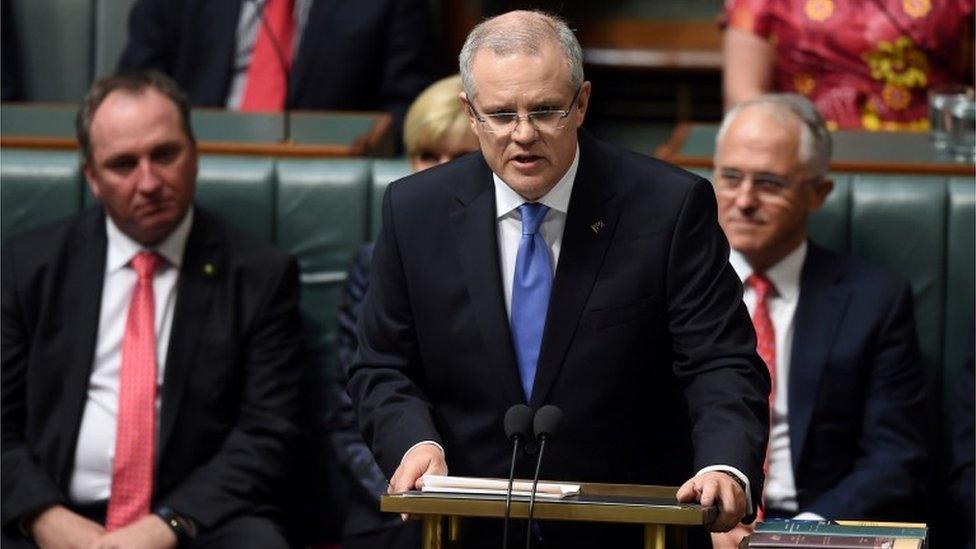Duncan Storrar: The instant hero torn down in days
- Published
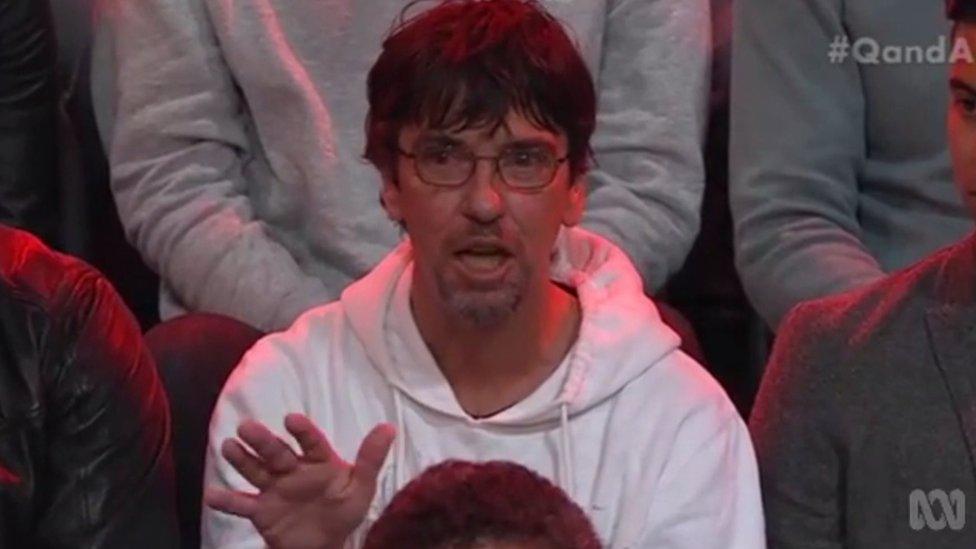
Duncan Storrar, from the Australian city of Geelong, was called a "national hero" after asking a question about tax on television
An Australian man who asked politicians why he wasn't getting a tax cut has become a symbol for progressives and a target for conservatives, writes BBC Australia editor Shaun Davies.
Duncan Storrar is an ordinary Australian in extraordinary circumstances. In the space of four days he's been heralded as a national hero, given A$60,000 ($44,000; £30,000) in donations and revealed as a drug-using criminal with an extensive rap sheet.
Yet all he did was ask a question on a television show.
Every Monday night, political enthusiasts tune into Q&A on the Australian Broadcasting Corp to see a panel of politicians, commentators and academics face a studio audience of ordinary Australians.
Bespectacled, messy haired and dressed in a white hoodie, Storrar made his Q&A appearance on 9 May, the first day of the Australian election campaign. He asked the panel, external about the government's plan to give workers who earn more than A$80,000 a year a tax cut, while providing nothing for low-income earners.
"If you lift my tax-free threshold that changes my life," he said. "That means I get to say to my little girls, 'Daddy's not broke this weekend, we can go to the pictures'.
"Rich people don't even notice their tax-free threshold lift. Why don't I get it? Why do they get it?"
The studio audience erupted in applause. Conservative panel members struggled to find a narrative - Assistant Treasurer Kelly O'Dwyer drew particular disdain when she settled on explaining how the government's planned tax cuts for business could help a cafe buy a A$6,000 toaster.
Unlike most Q&A audience members, Storrar cut through. His simple, plaintive message resonated through social media and was quickly picked up by major Australian news websites.
Hero to villain
Commentators on the left side of politics immediately developed an acute case of Duncan-mania. He was dubbed a "good bloke", then soon after a "national hero". #istandwithduncan started trending on Twitter.
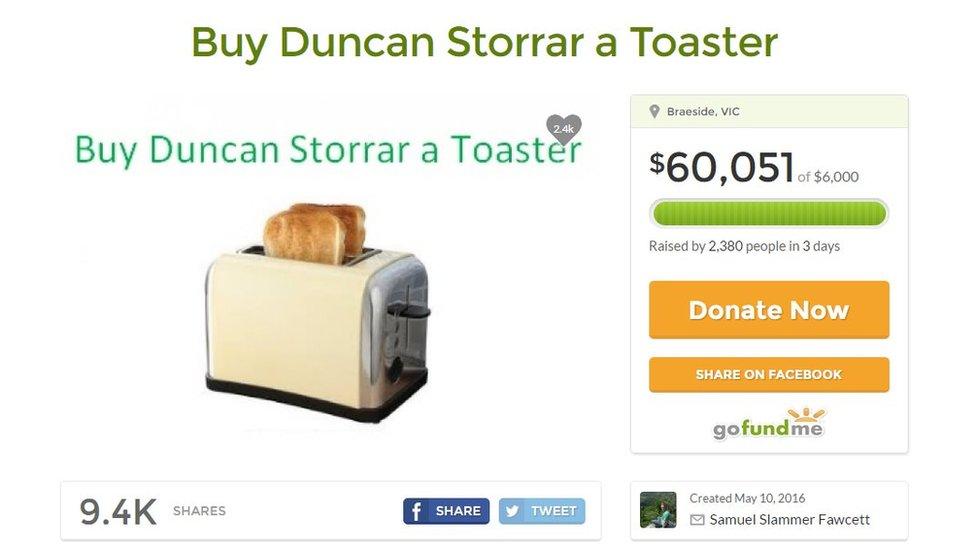
The organisers of a donation page to buy Duncan Storrar a toaster say they've engaged help to manage the $60,000 they have received
Someone started a tongue-in-cheek GoFundMe page, external to raise enough money to buy Duncan a toaster. Its target was A$6,000 - it has now raised more than A$60,000.
Duncan Storrar had been transformed, literally overnight, from a regular bloke with a valid question to an everyman symbol for progressive politics.
But for every action there is an equal and opposite reaction, and so it proved with Storrar. It took just one day for the nation's conservative broadsheet, The Australian, to go on the attack, first by demonstrating that he, in fact, paid no net tax when his social welfare payments were taken into account.
Harsher assessments followed. His son, Aztec Major, told The Australian that he had gone to live with his estranged father at age 17, only to end up addicted to drugs. He urged people to donate to charities, rather than giving to a man he described as "undeserving of the money".
On Friday, Storrar's lengthy criminal record was revealed. Various media reported that he had been convicted for offences including assault, drug possession and threatening to kill. He had also breached intervention orders taken out against him by ex-partners.
Storrar has gone to ground, overwhelmed by the unexpected intensity of the coverage. The revelations of his criminal past call into question the fate of the A$60,000 in donations. Commentators on the left are crying foul at the brutal takedown; those on the right are crowing that "social justice warriors" have turned a criminal into a hero.
Mainlining the mood
It took a particular mix of circumstances to whip up this media storm. Australia's election campaign is in full swing and the Liberal-led government and Labor opposition are sharply divided on tax policy. The government wants to lower the company tax rate over 10 years, while Labor wants to outlay billions of dollars on education and health.
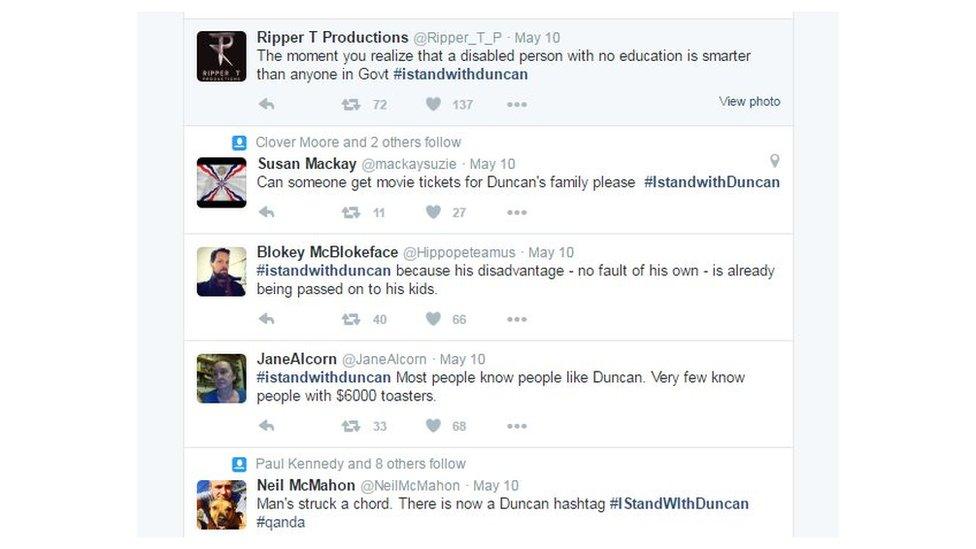
#istandwithduncan was a trending topic on Twitter, with most users initially supporting his comments
Accusations of "class warfare" have been flying thick and fast.
Storrar stepped into the middle of this narrative. The simplicity of his question and his disarming delivery caught the conservative panellists off-guard. Their flummoxed responses fed a great story - Aussie battler takes on intellectual snobs and wins.
Added to this is the pressure cooker of social media and digital news, where people can be raised up and then squashed in a matter of hours. Fifteen years ago, Storrar's moment in the spotlight would most likely have ended when the Q&A credits rolled. This week the Duncan train rolled on for four days straight.
Despite his past misdeeds, it's hard not to feel sorry for Duncan. He didn't ask to be made a hero and he didn't ask for donations.
He has a dubious past, but so do thousands of other Australians with criminal records. Most don't end up with their worst moments exposed before the entire country to prove an ideological point.
He will probably get to keep at least some of the A$60,000 donated to him, although ironically it may push him into a higher tax bracket. The media circus will find its next sideshow and life will move on. The left and right of politics are busy throwing stones at one another, but the truth is both sides played their role.
Duncan Storrar's story is a modern-day fable that contains salient lessons about the internet's mob mentality. You can build a hero in a day, but you can tear them apart just as quickly.
- Published8 May 2016
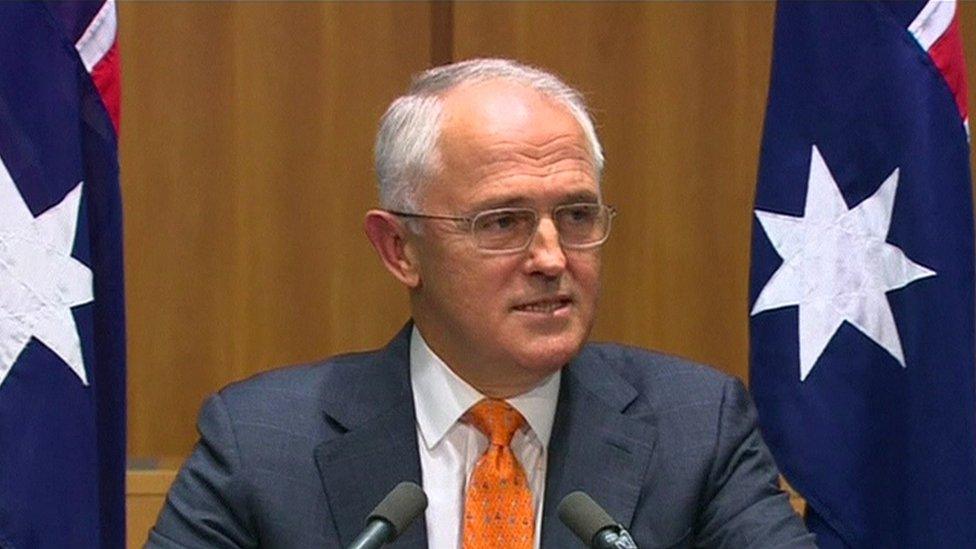
- Published9 May 2016
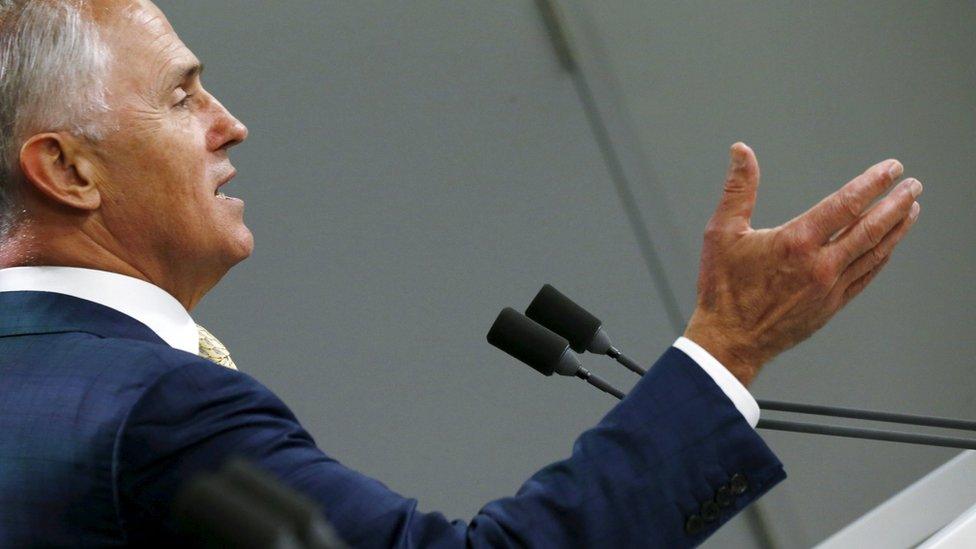
- Published3 May 2016
